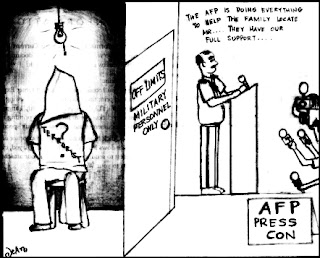Violence is the exertion of force so as to injure or abuse.
- MERRIAM-WEBSTER DICTIONARY
Last week, the palace released the order to roll back the conversion of the 144-hectare Sumilao land and return it to the embrace of agriculture. Through the order was in no way conclusive as to the fate the Sumilao farmers' claim, it was, at least, small victory for the them, who took painful discouraging steps for more than ten years in a struggle to achieve a life of dignity and respect. And with this small victory, they were able to return home in time for Christmas for free, carrying with them gifts twice their combined body weights. A Merry Christmas, indeed.
I was fortunate enough to take part in what we considered their "last march to victory" from the DAR office in Quezon City to the Malacañang Palace in Manila. Church leaders from different orders and denominations fortified their ranks as well as students and members of civil society groups. This was the most silent and peaceful march I have ever experienced. Under the heat and smog of Metro Manila, we made it to the seat of power and home of the Filipino people.
I trust that I don't have to retell the story of Sumilao Farmers. This ridiculous tale has been all over the papers since October, betraying the laggard mechanisms of Filipino governance. Back in '97 the farmers staged a 28-day hunger strike, which resulted to an acceptable compromise, only to be taken away by the Supreme Court. This year, they walked for sixty days from Bukidnon to Manila and continued to walk around the Capital Region for another fifteen days, moving from one heartache to another... one rejection after another by a government that had sworn to protect its people.
Witnessing all these things, I realized that these farmers are some of the most violent people I have ever encountered. Beneath their smiles and cheerful dispositions, they have caused so much pain against themselves... against their own bodies, their own minds and their own emotions. They have willingly subjected themselves to suffering that compounded the burden they were already carrying. Hence, these people of the soil are masochists of the highest grade.
 |
| Tired of injustice, yet? |
Some high and mighty members of the business community have a criticized these farmers for acting out of emotion and seducing the public to fall in love with the dramatics and romanticism of the whole exercise. Indeed, Atty. Bag-ao admitted that these were "dramatics". These were emotion-wrenching moves to wake people up. But these were acts done only because people refused to listen to reason from the very beginning. Law is a difficult thing to understand (in spite of the palpable simplicity of this case). People will not take these things seriously until they are able to visualize the actual suffering. And this is what the farmers had provided for us: They painted a 75-day picture for the entire nation to comprehend just how unjust the system has become. Because reason was no longer viable, they had to resort to violence -- self-inflicted violence.
For 75 days, these farmers led the country to a place it's people had long forgotten. There is no such thing as a peaceful protest. Violence will always be present. The only difference is against whom this violence is directed. In this case, it was absorbed by the protesters themselves, never minding that they already had suffered much. For indeed, violence is nothing more than inconvenience multiplied a hundredfold. And for a few people to go through this, to completely abandon their comfort zones just to pursue something worth living for, is nothing short of heroic.
These people were not beggars... far from it. They were legitimate suitors who were merely calling the government's attention to an oversight that was so clear that it was grave moral abberation that the case lasted for as long as it did. These people never asked for anything. They were claiming what was already theirs: the land and all the dreams they had attached to it.
A couple of days before the farmers packed up for home, we were able to join them at a thanksgiving mass at the Church of the Gesu, where Fr. Danny Huang gave a priceless homily in three languages (English, Tagalog & Bisaya), he spoke of hope as living in the future -- to act as if your goal was "already there" -- na ang Paglaum kay kanang pagtuo nga anaa na kanimo ang imong gipangita.
Hope in our country is not difficult to find, regardless of the pain you see around you. Consider this: The farmers walked for 75 days, carrying with them only their clothes and beddings, with little or no money or food. They marched under the heat, the rain and they even weathered a storm along the Bicol territories, but never did a day pass by where they were left hungry. No sun ever set leaving the farmers without a roof over their heads. Wherever they went, there were kind souls who understood and empathized. This was a miracle to match the multiplication of bread and fish thousands of years ago. Heroes create heroes. Their power does not come from intelligence or skill, but the will to move others to take action for something greater than themselves... this is sacrifice... this is violence.
May the star of Christmas shine brightest on Sumilao this year.



